Marie Antoinette
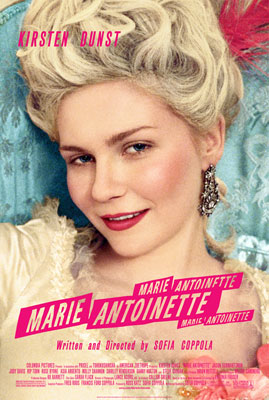
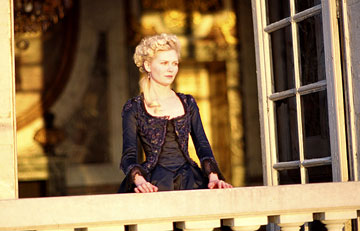 The film begins when Marie (portrayed in this film by Kirsten Dunst) is sent away from her home in Austria, as well as her family and her friends, in order to marry to future King of France, Louis Auguste (Jason Schwartzman). It is not a marriage out of love or consent, rather they have been arranged to marry by Louis' father, the current King (Rip Torn), to produce a new heir to carry on the family throne. The relationship is rocky from the very start, as Marie's husband seems more interested in his hobbies of making keys and hunting than in her. When it comes time for Marie to assume the throne as Queen, she becomes notorious for her wild partying, gambling and her unorthodox views on ruling. Although she is able to fulfill the family's desire for an heir, Marie finds herself in the center of a revolution as the people of France begin to grow weary of the lack of money and food left for them. With her country's faith in the royal family dwindling, she must find a way to protect herself and her family before the growing rebellion reaches the palace gates.
The film begins when Marie (portrayed in this film by Kirsten Dunst) is sent away from her home in Austria, as well as her family and her friends, in order to marry to future King of France, Louis Auguste (Jason Schwartzman). It is not a marriage out of love or consent, rather they have been arranged to marry by Louis' father, the current King (Rip Torn), to produce a new heir to carry on the family throne. The relationship is rocky from the very start, as Marie's husband seems more interested in his hobbies of making keys and hunting than in her. When it comes time for Marie to assume the throne as Queen, she becomes notorious for her wild partying, gambling and her unorthodox views on ruling. Although she is able to fulfill the family's desire for an heir, Marie finds herself in the center of a revolution as the people of France begin to grow weary of the lack of money and food left for them. With her country's faith in the royal family dwindling, she must find a way to protect herself and her family before the growing rebellion reaches the palace gates.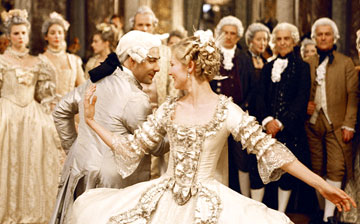 Never before has a movie so aimless and frustratingly lethargic hit the big screen until Marie Antoinette. With many scenes containing no dialogue at all, or simply whispered murmurs, it does not take very long for the viewer to realize that there is very little to entice or excite. Yes, the scenery is beautiful, and yes the sets and costumes are grand, but it's all show and absolutely no go whatsoever. There is no real tension that's ever established until the final 15 minutes or so, so we're simply forced to watch the actors walk around in powdered wigs and the beautiful scenery. This may be enough for some, or for those who are highly interested in the story of the famous Queen, but for anyone with little to no knowledge of her life, they will be left wondering why Copolla felt this particular take on her story needed to be on the big screen. In fact, I question if those interested in Antoinette will be satisfied with this film offering, as it glosses over many of the more famous aspects of the story. The fact that the movie does not even bother to depict her walk to the guillotine is not only mystifying, but makes the story feel incomplete. Indeed, the way the movie ends, it looks like the production budget suddenly ran out, and they suddenly had to stop filming. At least, that's what I'm assuming considering how abrupt the end credits are when there seems there should be just a little bit more. Not that I wanted there to be more, mind you. Two hours of actors meandering around pretty scenery was more than enough for me.
Never before has a movie so aimless and frustratingly lethargic hit the big screen until Marie Antoinette. With many scenes containing no dialogue at all, or simply whispered murmurs, it does not take very long for the viewer to realize that there is very little to entice or excite. Yes, the scenery is beautiful, and yes the sets and costumes are grand, but it's all show and absolutely no go whatsoever. There is no real tension that's ever established until the final 15 minutes or so, so we're simply forced to watch the actors walk around in powdered wigs and the beautiful scenery. This may be enough for some, or for those who are highly interested in the story of the famous Queen, but for anyone with little to no knowledge of her life, they will be left wondering why Copolla felt this particular take on her story needed to be on the big screen. In fact, I question if those interested in Antoinette will be satisfied with this film offering, as it glosses over many of the more famous aspects of the story. The fact that the movie does not even bother to depict her walk to the guillotine is not only mystifying, but makes the story feel incomplete. Indeed, the way the movie ends, it looks like the production budget suddenly ran out, and they suddenly had to stop filming. At least, that's what I'm assuming considering how abrupt the end credits are when there seems there should be just a little bit more. Not that I wanted there to be more, mind you. Two hours of actors meandering around pretty scenery was more than enough for me.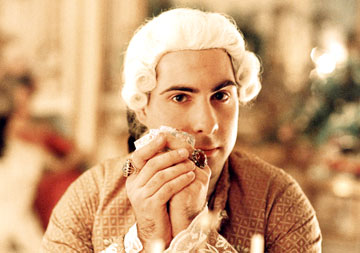 Much has been made of the fact that Sofia Copolla decided to use a number of pop songs from the 80s for the film's soundtrack. Some people have applauded the decision, while others have been up in arms, saying that it cheapens the experience of the film. I fall somewhere in the middle. On one hand, the pop soundtrack is one of the few aspects of this film that is actually fun and shows a sign of life. And yet, the songs are placed so sporadically and far apart from each other that the soundtrack almost seems to be an afterthought and winds up being one of the more forgettable aspects of an already forgettable film. After a short tune played during the film's opening credit sequence, it's a good 35 or 40 minutes until we get the next one where we get a scene set to the song "I Want Candy". While the idea of setting a classic story to more modern music is clever, Copolla does not know how to use the songs in such a way so that they complement the scene. They are used so rarely that when they do appear, it seems foreign and alien. Films like A Knight's Tale or Moulin Rouge were able to use contemporary music in a historical setting with much more energy and wit. In those films, the music felt like it was a part of the story. Here, it is usually a distraction, but at least it's a distraction that wakes us up now and then.
Much has been made of the fact that Sofia Copolla decided to use a number of pop songs from the 80s for the film's soundtrack. Some people have applauded the decision, while others have been up in arms, saying that it cheapens the experience of the film. I fall somewhere in the middle. On one hand, the pop soundtrack is one of the few aspects of this film that is actually fun and shows a sign of life. And yet, the songs are placed so sporadically and far apart from each other that the soundtrack almost seems to be an afterthought and winds up being one of the more forgettable aspects of an already forgettable film. After a short tune played during the film's opening credit sequence, it's a good 35 or 40 minutes until we get the next one where we get a scene set to the song "I Want Candy". While the idea of setting a classic story to more modern music is clever, Copolla does not know how to use the songs in such a way so that they complement the scene. They are used so rarely that when they do appear, it seems foreign and alien. Films like A Knight's Tale or Moulin Rouge were able to use contemporary music in a historical setting with much more energy and wit. In those films, the music felt like it was a part of the story. Here, it is usually a distraction, but at least it's a distraction that wakes us up now and then.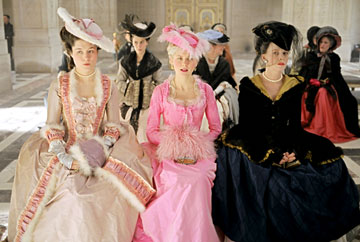 It's not just the music that is contemporary, but the performances as well. Marie Antoinette and her group of friends are played up almost as spoiled socialites who like to party a bit too much and have more fun than they should. The film does nothing with this idea, however, and they simply giggle and titter their way through every scene, not coming anywhere close to creating a character that the audience or the actors themselves can attach themselves to. Oddly enough, no one in this movie even attempts to speak in a French accent. Kirsten Dunst reads all of her lines like she's talking casually at a party with friends, Jason Schwartzman as her husband is too dry and dull to warrant any sort of response (Yes, I know his character is supposed to be a bit dry, but he plays it a bit too much so that we cannot sympathize with him at all.), and Rip Torn is one of the most miscast Kings since Tom Selleck played King Ferdinand of Spain in Christopher Columbus: The Discovery. The rest of the cast simply stand in the background, dressed in authentic costumes, and whisper about the character of Marie Antoinette. Not one single character or performance in this film is even remotely believable, and what's more, some of the cast members seem to be wondering what they're supposed to be doing. Maybe Copolla didn't explain her "vision" to them. I sure wish she'd explain it to me, maybe then I could make some sense out of this mess.
It's not just the music that is contemporary, but the performances as well. Marie Antoinette and her group of friends are played up almost as spoiled socialites who like to party a bit too much and have more fun than they should. The film does nothing with this idea, however, and they simply giggle and titter their way through every scene, not coming anywhere close to creating a character that the audience or the actors themselves can attach themselves to. Oddly enough, no one in this movie even attempts to speak in a French accent. Kirsten Dunst reads all of her lines like she's talking casually at a party with friends, Jason Schwartzman as her husband is too dry and dull to warrant any sort of response (Yes, I know his character is supposed to be a bit dry, but he plays it a bit too much so that we cannot sympathize with him at all.), and Rip Torn is one of the most miscast Kings since Tom Selleck played King Ferdinand of Spain in Christopher Columbus: The Discovery. The rest of the cast simply stand in the background, dressed in authentic costumes, and whisper about the character of Marie Antoinette. Not one single character or performance in this film is even remotely believable, and what's more, some of the cast members seem to be wondering what they're supposed to be doing. Maybe Copolla didn't explain her "vision" to them. I sure wish she'd explain it to me, maybe then I could make some sense out of this mess.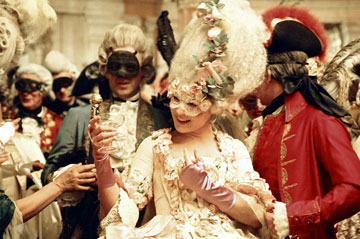
When Lost in Translation came out a couple years ago, Sofia Copolla was heaped with awards and praise for the film. While I thought it was somewhat overrated, I was still able to find some enjoyment in the story and the characters. There is nothing to like in Marie Antoinette, aside from some very nicely filmed scenic shots. The movie is about as animated as a corpse from almost frame one, holds not the slightest bit of joy or inspiration. It is simply a case of a director with a runaway project idea with a budget. It seems as if Copolla lost control somewhere. Either that, or she didn't have a clear plan or vision to start with. Whatever the reason, Marie Antoinette deserves the reaction it received at the Cannes Film Festival where it was literally booed by its audience after it was finished. I merely had to settle for shuffling silently out of the theater as soon as the credits began to roll to show my displeasure. Well, that, and writing this review.
See the movie times in your area or buy the DVD at Amazon.com!






0 Comments:
Post a Comment
<< Home